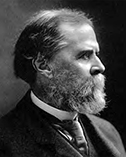
 Wolcott Gibbs
Wolcott Gibbs
1895-1900 NAS President
The next choice for president was the chemist and charter member of the Academy Oliver Wolcott Gibbs (1822–1908), who had refused the office earlier, but was now willing to serve between 1895 and 1900. He had an excellent foundation in analytical and inorganic chemistry obtained at home and abroad and was deeply committed to a research career. His first opportunity after returning from studies in Europe came through a teaching position at City College in New York where he obtained access to laboratory facilities for both students and research. He remained there productively for seven years. In 1863, he was offered the Rumford Professorship at Harvard, a prestigious post endowed in his will by the notorious Tory scientist and adventurer Sir Benjamin Thompson as somewhat in the nature of a peace offering to his native land for his role in opposition to independence in the Revolutionary War.
At Harvard Gibbs had good access to research facilities and research students initially, but these were denied him after 1871 as a result of the reorganization of the university and its adjuncts. It is strongly suspected that the administrations of both Harvard and Yale desired to downgrade the status of science as a university discipline at the time and give stronger emphasis to the classics. Gibbs' research activities were ultimately confined to those in a private laboratory he had developed at his summer home. He gained special fame for his work on the platinum family of elements.
John von Neumann (1903–1957) once whimsically commented that science seemed permanently secure at Princeton University. Each time an incoming administration stated that it planned to downgrade science in favor of some other field of endeavor science had managed to become stronger.
While Gibbs' service to the Academy was somewhat relaxed during his five years in office, he did take a strong interest in matters of conservation of natural resources. He was appalled at the wanton exploitation of the nation's forest and mineral lands that was occurring as a result of the activities of the lumber and mining companies, and he worked closely with Congress to produce correctives. For example, he was effective, with the help of advisory committees composed of distinguished individuals, in supporting legislation that created a system of National Forest Preserves in 1901. Initially the act focused on Western forests, but was extended to the Appalachians in 1916.
Muir-Pinchot Debate
This was the period in which a great debate arose concerning the actual manner in which the public forest preserves should be maintained. John Muir supported the policy of “forever wild” whereas Governor Gifford Pinchot of Pennsylvania believed that generally and in the long run we should follow the European practice of carefully grooming public forestlands in order to reduce the risk from uncontrolled fires and plant disease and to optimize the quality of lumber—a valuable resource. This issue has not yet been resolved, being still a matter of open controversy. Muir, supported by President Theodore Roosevelt, succeeded in helping to create the Western national parks. He appealed broadly to the public through a series of brilliant essays on the subject, and overcame opposition from the lumbering interests.
Continue reading next chapter: Alexander Agassiz

